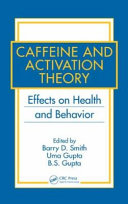Caffeine and Activation Theory
| Series: | |
| Publisher: | Taylor & Francis |
| Subject: | Caffeine--Physiological effect, Caffeine--Health aspects. |
| Authors: | Barry D. Smith , Uma Gupta , B.S. Gupta |
| Pages: | 400 pages |
| Binding: | Hardcover |
| ISBN: | 9780849371028 |
| Call No: | QP801.C24 C332 2007 |
The virtually universal popularity of caffeine, together with concerns about its potential pathogenic effects, have made it one of the most extensively studied drugs in history. However, despite the massive scientific literature on this important substance, most reviews have either focused on limited areas of study or been produced in popular form by individuals with surprisingly little relevant scientific background.
Caffeine and Activation Theory: Effects on Health and Behavior brings together the leading experts from seven different countries to provide researchers and clinicians with the most comprehensive and balanced review of the scientific literature on the effects of caffeine found anywhere. It devotes unprecedented coverage to the impact of caffeine on cardiovascular functioning and pathology, details the pharmacological properties and neurophysiological effects of the drug, and thoroughly reviews literature concerned with the role of this powerful stimulant in mood, task performance, and psychopathology. This important new book is also the first source to provide an integrative scientific treatment of the effects of caffeine consumption on menstrual endocrinology and pathology, as well as on reproduction. Rounding out the coverage is a thorough review of emerging research on the possible benefits of caffeine and catechins in green and black teas.
The highly integrative final chapter provides a clear understanding of what is known about the effects of caffeine, identifies specific areas in which further research is needed, and provides important methodological guidelines that promise to optimize future research endeavors. Filling the need for a current comprehensive resource, this volume provides extensive reviews of the major bodies of literature on caffeine, stimulates and guides future research, and provides clinicians with the information they need to understand, diagnose, and treat the effects of caffeine consumption in their patients.

